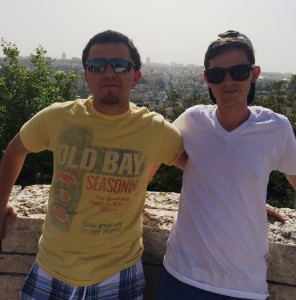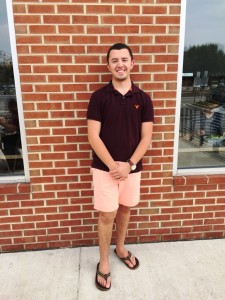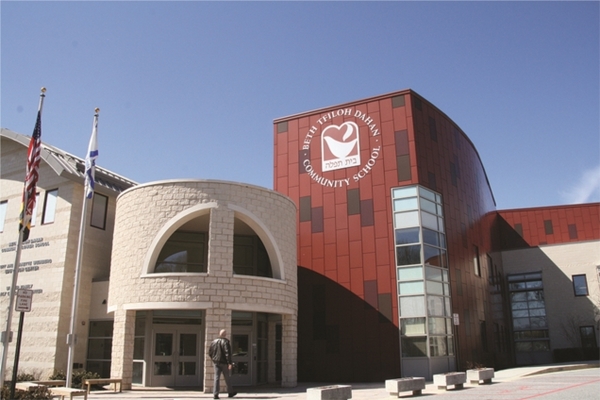Baltimore’s Zach Azrael wins Diller Teen Tikkun Olam Award
Zach Azrael, an 18-year-old recent graduate of the Beth Tfiloh Dahan Community School in Baltimore is one of 15 teenagers throughout the U.S. to receive Diller Teen Tikkun Olam Award, a $36,000 scholarship given to students who displayed leadership, and service projects in the community.
Azrael co-founded the Tutor Outreach Program (T.O.P), which provided free tutoring to students between the ages of 5 and 14 for two hours after school each day.

“Working with Zach was amazing,” said Cole Abell, a recent graduate of the Beth Tfiloh Dahan Community School who is working with Azrael to create the training videos for the T.O.P program. “He was able to inspire everyone. He helped us to see the issues the students were going through. He really helped us partake in T.O.P by showing leadership skills. Any issues the volunteers had he would straighten them out, or get staff involved. For example if a fight broke out, Zach would get the staff involved and inform us to not get involved with the incident because we were not trained to handle situations like that.”
Azrael is working with the US Dream Academy training and meeting with administrators/staff of the US Dream Academy, to use the curriculum he came up with for the T.O.P program. The US Dream Academy plans to use his curriculum for all their other locations across the United States.
“Zach managed to run T.O.P in a professional manner [and] was impressive,” T.O.P. co-founder Chase Berman said. “He was a positive impact with everyone around him. If it wasn’t for him the program wouldn’t be ran in such a positive way. His maturity he challenged me to succeed. Whenever I would have a problem he would always come up with a solution. He always was on top of things. Any issues that arose he took care of it immediately. If there were any a problems he couldn’t control he would go to the principal or teachers and get the issue resolved.”
He came up with the idea of T.O.P after his first day of volunteering at Pimlico Middle School, as all students at Beth Tfiloh Dahan Community School must volunteer in their communities before graduating. However, Azrael fell in love with tutoring, especially his relationship with the students, who viewed tutors as mentors, not teachers.
BPE: What is the US Dream Academy program, how are you associated with that program?
Azrael: I am associated with them through the T.O.P program, the organization I founded. The US Dream Academy is our partner. This program is a mentor program similar to a Big Brother and Big Sister program but it happens at the facility. Their goal is to have a program for children whose parents or close relatives are incarcerated.

BPE: How did you come up with the Tutoring Outreach Program (T.O.P)?
Azrael: As vice president of The National Honors Society, my project was to receive service. We gave free tutoring throughout the school that I recently graduated from, Beth Tfiloh Dahan Community School. This school went from kindergarten to 12th grade. This is a private school and we had a lot of resources given to us. I felt a lot of people could benefit from the resources that we received from our private school. I didn’t realize the benefit from my private school until I started tutoring at Pimlico Middle School.
The students at Pimlico Middle School cannot have textbooks because they don’t have enough money to supply them. Many students have to share pencils because they don’t have the money to bring materials in. I wanted to start a program where I can help bring volunteers in to assist the children with their homework.
When I went on the first day I went with two other volunteers to view the school, and I fell in love with the children. They were receptive and excited to learn, and they were so appreciative. I respect their love for learning because they soaked up the information, and when they have the opportunity to learn they really took us up on it. After that first day I decided I wanted to expand and help children because they really needed the help. I didn’t think two hours a week was enough for the students. The first day of the program, when we started tutoring, was Oct. 1, 2013.
By November 2013, we expanded to three days a week two hours a day with 25 high school volunteers a week. I received volunteers from word of mouth. I spoke with friends in my school. Beth Tfiloh Dahan Community School has a requirement for community service hours, and that was how I encouraged other students in my school to help with the program. Out of 80 students from my school who volunteered, one decided not to come back. His reason was because he volunteered at a local fire station so he couldn’t commit to the time.
By February 2014 we expanded to five days and fifty volunteers a week. This is the current goal. This goal allows us to have at least ten volunteers a day, and for the program I created I found out this is the perfect number, anything less than that it becomes hectic and any more than that volunteers wouldn’t get a chance to help tutor the children.
Our Mission is to serve the students to experience education inequality. The second part: It’s empowering our volunteers to make a change.
Studies have shown students who volunteer at the ages of 25 and below consistently, will continue to volunteer for the rest of their lives.
The goal is to foster the love of the service in our volunteers. We are not making a change now, but by creating a generation of volunteers this will continue to make a different in years to come. Which is the outreach aspect of T.O.P. This part of the mission has been one of the coolest to me. Because we started off just tutoring, and then some of the volunteers will come up to me and informed me that the students wanted additional information about science. In the school year of 2013-2014, when we started a science club, the Pimlico Middle School students in our science club grades improved from a 66 to 85. This data was from the school itself. This was a great accomplishment for me to see.
BPE: How did you decide what school to volunteer for? What made you choose Pimlico Middle School?
Azrael: I choose Pimlico Middle School through the US Dream Academy. They had a center already established at Pimlico Middle School. The caregiver of the student had to sign the student up and complete a variety of forms. Some students didn’t have a parent incarcerated but they live in a high crime community. U.S Dream Academy’s goal was to also work with children who had a high risk of being incarcerated themselves, getting involved in gangs, and dropping out of school.
 BPE: What makes you want to work with children?
BPE: What makes you want to work with children?
Azrael: I didn’t want to work with children before, but when I went to tutor I saw a need and I wanted to help. The entire time it didn’t feel like work, it was fun. I saw the enjoyment and the potential these students had and I wanted to be apart of them getting more education.
BPE: How difficult was it to work with children living in high-crime environment?
Azrael: It didn’t feel difficult to me. I connected with them quickly. Some of them reminded me of my sister, my friends, and even myself. They are children just like anyone of us. There were times I would hear things that reminded me of their situation, but as a whole they wanted to learn. They acted out sometimes because of the traumas they faced in their personal life, and that was understandable. They wanted the same things I wanted when I was a kid. Throughout tutoring them it never got to the point where I wanted to quit or give up.
BPE: Were students ever pulled out of the T.O.P program?
Azrael: There were times when the parent/guardian pulled them from the program for many number of reasons. Students got pulled out because it would get darker earlier and their parent(s) wanted them home early for safety reasons. Many of the reasons were personal, and up to the family. As volunteers we didn’t get involved with the reasons why. However, the students that stayed witnessed dramatic improvement with their learning skills.
BPE: What have you learned from the students you tutored?
Azrael: The students taught me to question. They asked me why about everything I told them. Although that was annoying I see value and growth from them. I’ve learned a lot of things, so it’s hard to pinpoint one. I will say this: one day I was driving with a student I tutored, he was 16, and he noticed people running in a neighborhood.
He stated, ‘Wow I wish I could run,’
I asked him, ‘Why don’t you think you can’t run?’
He stated, ‘well in my neighborhood if a person is running they have a risk of running into someone they don’t want to, or the police will assume that I did something.’
You think certain things are important to you but when you hear something that is of value from a person who lives a differently lifestyle, you start to realize what is really important. I also can say I’ve learned patience. Working with the students five days a week can get difficult. I learned how to appreciate what I have learned in school and the opportunities I was given when I was in middle school. I’ve changed so much after working with these students.
BPE: Are you done with the T.O.P program now that you graduated?
Azrael: I am going to stay involved with fundraising, expansion and management. The new leadership role for the student volunteers has trained from 5-13 months to take over the position, now that I have graduated. The longest training took 13 months, and that was to take over the director position. The five-month training was for club programs. Once T.O.P grew I had to make club programs for specific topics that are: High School and College Readiness, Science, World Culture, Literature, Arts, Athletics, and Film. There is also a basketball club that has 25 students in it. This curriculum is for fifteen students for each club once a week for the entire school year. T.O.P ran these programs for the students and raised all of the funds for these programs from local donors. There were high school students who committed to over 500 hours for the T.O.P program. I also created an internship in 2014 to build the curriculum for the T.O.P program for the school year. I am going to try to stay involved in any way I can.
BPE: There are other volunteer programs, why do you think your program is successful?
Azrael: The difference with T.O.P is that students are tutoring students. Which is a great learning opportunity for the student volunteers to learn as well as the students who are learning.
BPE: During the Freddie Grey incident, how did the children feel? Was it difficult to tutor them, were they distracted?
Azrael: When this incident happened the conversation was left for the US. Dream Academy to talk with the students. The students met with the staff of the US. Dream Academy an hour before the volunteers got there. If there were any conversations about it, it was discussed within that hour, and not with us. T.O.P didn’t talk with the students about it because we didn’t want them to stray away from the learning nor did we have the expertise to explain what was going on.
BPE: Do you think children of that age have a voice in the curriculum you give them?
Azrael: Yes and here is an example. We wrote a curriculum for the computer science club, we were going to teach the students how to code a website. It turns out they were not interested in that. They wanted to learn how to make video and interactive games. We threw out the old curriculum and started over. I brought the director of the computer science program and he assisted with volunteering. They were fortunate to have a semi functional computer lab and he and other volunteers taught them programming. For the most part we try to make it fun for the students, but there were times when we wanted something different. However, we wanted to make sure the information provided to them was what they wanted to learn. We wanted to make it about them as much as we can. Some of the students in the T.O.P program were able to see the curriculum and gave me their thoughts about it.
BPE: How did you receive The Helen Diller Family Foundation Award? Were you nominated or did you apply for it?
Azrael: Halaine Steinberg nominated me for the award, and she supported me with helping T.O.P receive everything we needed. She also was my college guidance counselor and teacher. She was probably the most dedicated teacher I ever had. After the nominations, I had to spend hours to complete the application. There were 18 short essay questions I had to complete. There was no maximum word requirement but I had to write at least 200 words. I needed two recommendations, and the Executive Director Diane Wallace Booker, of the National office of the U.S Dream Academy wrote recommendations and a past teacher Laura Frank wrote the other one.
BPE: What do you plan to do with the scholarship?
Azrael: First, I would like to say I am thankful for The Diller Teen Tikkun Olam Award from The Helen Diller Foundation. It will allow me to go to the University of Maryland, College Park where I plan to study business and hopefully pursue a career in non-profit work. This scholarship offers me a lot more freedom in my education pursuit.
BPE: How do your parents feel about you having a program in this environment?
Azrael: My parents are happier than I am, they are very happy actually.They see me as a mature person. Creating T.O.P has helped people around me see me as an adult. I volunteer over 1,200 hours, and there was a lot of added responsibility that made people look at me in a different. I was doing something I loved. I feel so fortunate to find the thing that lights me up.

As a child I wrote novels because I didn’t have many friends. I would sit in the living room and pretend my friends were my characters. I would write a story and never complete it. I fell in love with the library on Beauty and the Beast, instead of the Beast. My childhood habits became my passion in life. In college I preferred to write in my journal than to go out to the clubs. I don’t listen to rap music as much because it’s difficult for me to understand, and when I hear the unedited version I am often surprised. I am someone who actually listens to the words and becomes perplexed at the lyrics. I think never and always are unnecessary words because life is unpredictable. Live, laugh, love is a great motto to live by, but if it was up to me I would replace the laugh with write.

